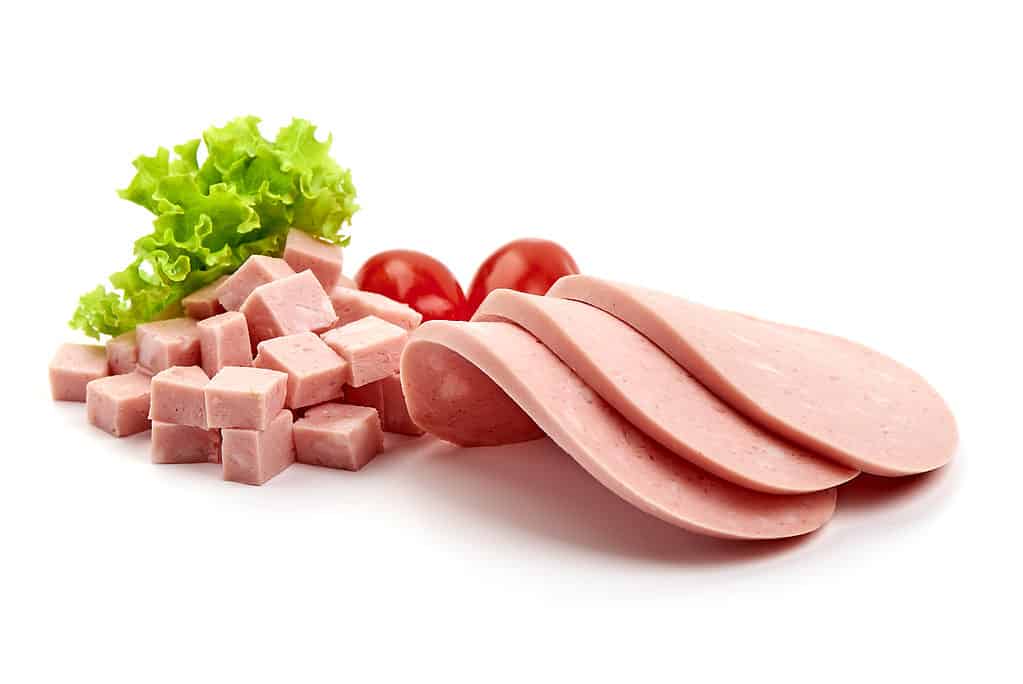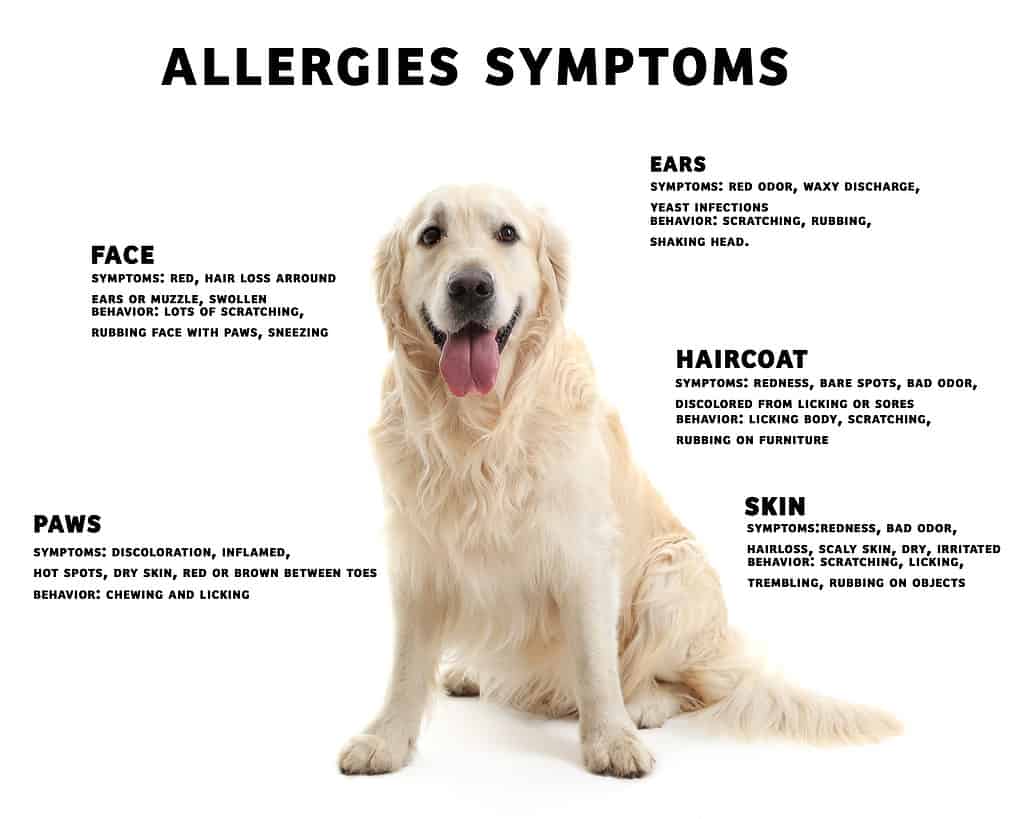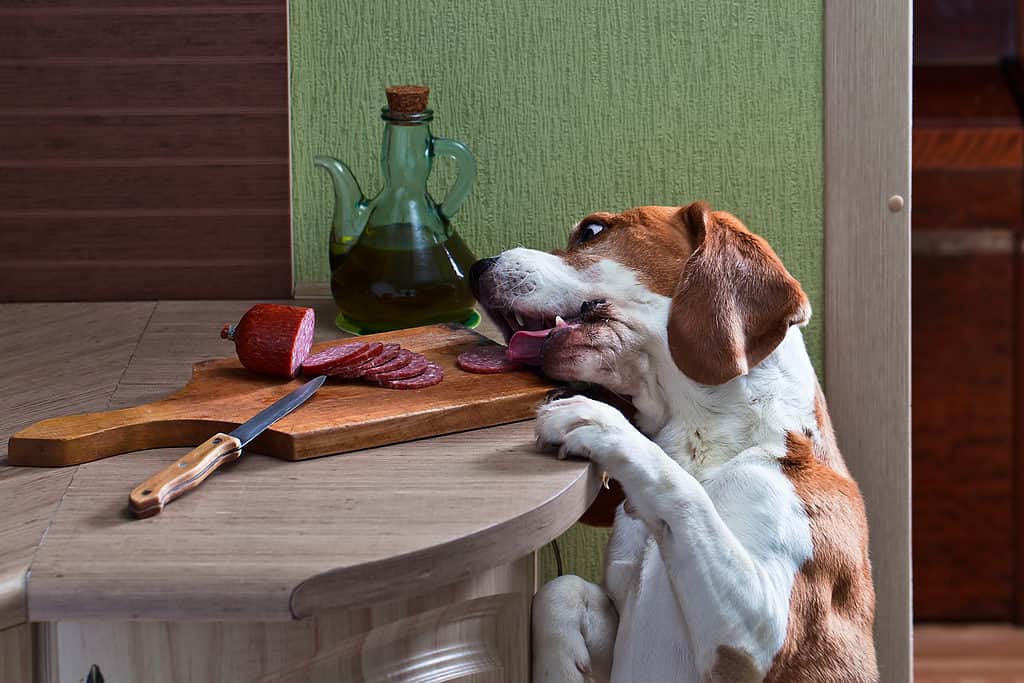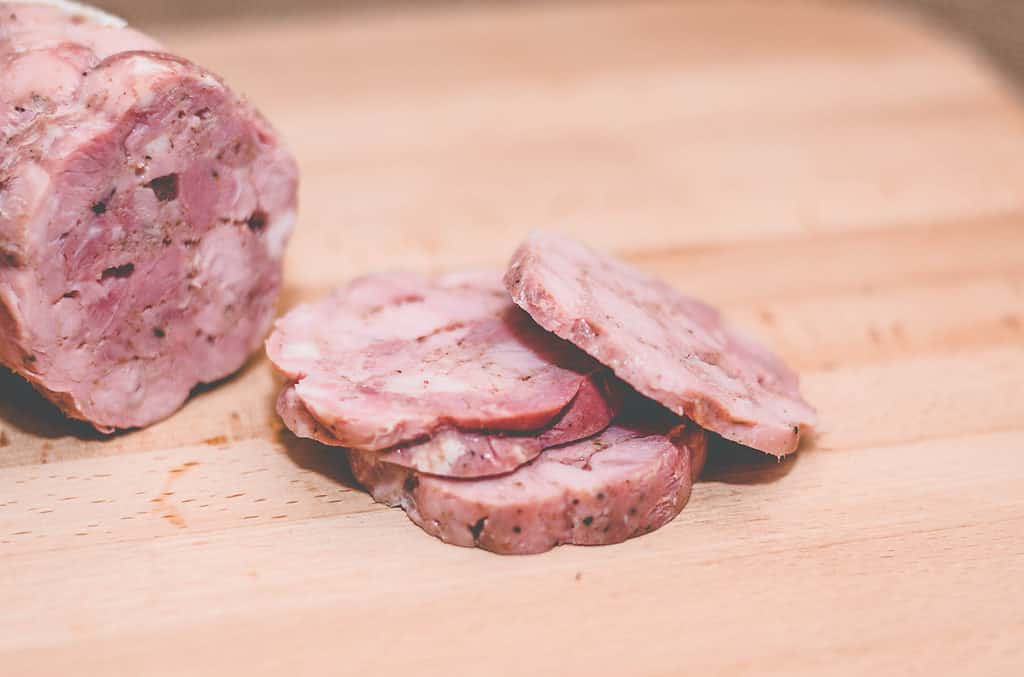Bologna is a type of meat. Therefore, it may seem like a good choice for dogs. However, this isn’t necessarily the case. While bologna does contain meat, it isn’t just meat. Usually, it contains a high amount of salt, preservatives, and other additives. The meat isn’t necessarily bad for your dogs, but all these extra ingredients are.
The main reason bologna is a poor choice for your dog is because of the salt content. Too much salt can be potentially deadly, though your dog would have to eat a lot of bologna for deadly symptoms to develop.
Keep reading for an explanation of why you should avoid bologna for your dog and what to do if your dog does eat it.
Downsides of Bologna for Dogs

Bologna is surprisingly high in calories for its nutritional value.
©GSDesign/Shutterstock.com
There are many potential downsides to feeding your dog bologna. One of the most obvious reasons is because of the salt content. Too much salt is not suitable for dogs. If consumed in very high amounts, it can lead to salt toxicity, which is potentially deadly. However, even in smaller amounts, it can lead to heart disease and kidney problems.
Dogs do need a small amount of salt in their diet. However, this should be provided by their complete, commercial dog food. You shouldn’t need to add any salt to your dog’s diet. Therefore, the added salt in bologna is completely unnecessary and potentially harmful.
Another potential downside is the fat content and calories. Bologna is surprisingly high in calories for its nutritional value. Therefore, if your dog eats a substantial amount, it may gain weight. Obesity is a severe problem linked to all sorts of health issues. Sadly, many dogs in the US are overweight.
The fat content in bologna can also lead to weight gain. However, fat can lead to health problems like fatty liver disease if consumed excessively. Eating bologna one time isn’t going to cause this problem, but it can if it’s eaten regularly.
Luckily, most of these health risks are caused by long-term consumption of bologna and similar foods. Your dog snatching one piece off the floor isn’t likely to cause any issues. However, bologna shouldn’t be consumed as a snack.
Allergies

If your dog has allergies, you’ll need to read the ingredients carefully to ensure that the bologna doesn’t contain your dog’s allergen.
©Africa Studio/Shutterstock.com
Another concern with bologna is allergies. Bologna is referred to as “mystery meat” because it can contain a wide variety of different meats. Of course, these will be listed in the ingredients section on the nutritional label. However, what bologna is made out of may not be apparent with a quick glance at the label.
If your dog has allergies, you’ll need to read the ingredients carefully to ensure that the bologna doesn’t contain your dog’s allergen.
In theory, this is pretty easy to avoid by looking at the ingredient list. However, it isn’t a perfect solution, as it can be pretty easy to forget. Luckily, dog allergies aren’t often severe. Therefore, grabbing one piece off the counter won’t cause serious issues for most dogs.
Potential Benefits of Bologna
Sadly, there aren’t many benefits of giving bologna to your dog. It is delicious for many canines. Therefore, it can work as a high-value treat. You may be able to avoid potentially dangerous situations by bribing your dog with bologna (such as if your dog runs out the front door).
However, bologna isn’t our first choice. It may be fine if it’s an emergency and that’s all you have on hand. But, it isn’t what we recommend buying as a high-value treat. Plain chicken is a much better choice.
Bologna is meat, so it is high in protein. However, it isn’t only meat, so the protein content may be lower than you’d suspect. Still, protein is suitable for dogs, but bologna isn’t the best way to increase your dog’s protein content.
We wouldn’t recommend bologna when you’re encouraging your dog to eat. Often, a dog isn’t eating because they have some underlying health issue. Bologna can make this health issue even worse. Low-sodium broth and similar foods are much better options.
What Happens If a Dog Eats Bologna?

If fed bologna regularly, dogs may develop nutritional deficiencies.
©Igor Normann/Shutterstock.com
If your dog eats bologna, you shouldn’t expect much to happen. One piece of bologna one time isn’t going to cause an issue. However, a series of other problems can occur with long-term bologna consumption.
Heart Issues
Bologna is high in sodium, so it can contribute to developing heart problems. Excess sodium is linked to increased blood pressure in humans, and a similar increase is expected in dogs. If it occurs once, an increase in blood pressure likely won’t be a problem. However, over time, too high blood pressure can cause heart issues.
Therefore, bologna should be avoided if for this reason alone.
Cancer
Bologna includes a high level of nitrates. These nitrates are found in most processed meats and improve flavor. However, it can increase your dog’s chance of cancer. Of course, the increased risk from a small amount of bologna isn’t going to be much. If fed regularly, the increased chance can be serious, though.
Nutritional Deficiencies
In many cases, nutritional deficiencies may also occur with long-term bologna consumption. Bologna doesn’t contain many nutrients. Therefore, your dog cannot just eat bologna. Eating a substantial amount may push other (more complete) foods out of their diet.
A dog that gets full on bologna isn’t going to eat their normal dog food.
Therefore, if fed bologna regularly, dogs may develop nutritional deficiencies. These all come with their own risks. While this isn’t likely to lead to death, it absolutely could if the deficiencies become chronic.
Pancreatitis
When a dog consumes too much fat, it may cause pancreatitis. This condition is caused by inflammation of the pancreas, which often develops when dogs consume too much fat. Pancreatitis can be acute if your dog consumes too much fat. However, it can also be chronic.
Pancreatitis doesn’t only occur after consuming a fatty meal. However, that is thought to be a contributing factor. Therefore, we do not recommend giving your dog tons of fatty foods, including bologna.
What To Do If Your Dog Eats Bologna

Unless there has been long-term consumption, bologna isn’t toxic to dogs and shouldn’t cause any problems.
©BLACK ROCK/Shutterstock.com
If your dog eats a piece or two of bologna, there typically isn’t anything to worry about. This occurrence shouldn’t happen every day. However, bologna isn’t toxic, and likely won’t cause problems when eaten once or twice. It’s long-term consumption that you should worry about.
If your dog eats tons of bologna (we’re talking about a whole pack or multiple packs), then your primary worry should be salt toxicity. We recommend grabbing the bologna’s nutritional information and figuring out how many pieces your dog probably ate. Then, call your vet or the pet poison control center.
Provide them with the nutritional information and when your dog ate the bologna (if you know). This information will help them determine if your dog is at risk of salt toxicity. You may need to take your dog to the vet for treatment, as salt toxicity can be deadly.
Final Thoughts
Bologna isn’t toxic. Your dog won’t develop toxicity symptoms after consuming bologna. However, all of the additives in bologna can be a problem. The high salt content is particularly worrisome, as too much can cause salt toxicity. Luckily, bologna isn’t so high in salt that a single piece will cause problems. Instead, your dog would likely have to eat many pieces (unless they are extremely small).
Still, bologna isn’t the healthiest snack. It includes nitrates and lots of fat – neither of which is healthy for your dog. Excessive consumption over time is linked with various health issues, including heart disease and pancreatitis. Therefore, we recommend avoiding bologna as much as possible.
If your dog sneaks a piece, they will probably be fine. However, do not give your dog bologna on purpose or as part of their regular routine.
Instead, we recommend finding a different type of meat for your dog. Plain meat is the best option. However, remember that your dog should primarily be eating their commercial, complete diet. This diet should contain everything the dog needs, while meat like bologna does not.
Up Next
The photo featured at the top of this post is © Javier Brosch/Shutterstock.com
Ready to discover the top 10 cutest dog breeds in the entire world?
How about the fastest dogs, the largest dogs and those that are -- quite frankly -- just the kindest dogs on the planet? Each day, AZ Animals sends out lists just like this to our thousands of email subscribers. And the best part? It's FREE. Join today by entering your email below.
Thank you for reading! Have some feedback for us? Contact the AZ Animals editorial team.






